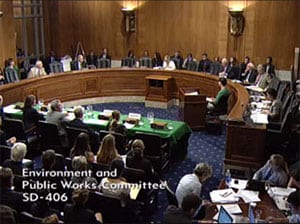I know we have a variety of readers, and who knows, some of them may be giving testimony and would appreciate helpful advice. This is from Roger Pielke, Jr. .
Here’s an excerpt:
Independent experts not affiliated with formal assessments are also commonly invited to provide testimony. A specific expert is asked to testify because policy makers see some political advantage in having that expert testify. Academics unaffiliated with government, advocacy groups, or formal scientific assessments should quickly disabuse themselves of any notion that they have been invited to “speak truth to power.” Rather, they are carefully selected for the perceived political benefits of their testimony.
In my case, I was invited by Republicans on the Senate committee because several Democrats, including President Obama, have recently been making statements about the relationship between human-caused climate change and extreme weather that go well beyond what can be supported based on current scientific understandings. The previous time that I testified before this same committee, I was invited by Democrats. An expert cannot control when their knowledge will be perceived as relevant, or by whom; but when an invitation is received, we have an obligation to participate in the democratic process.
Expertise is commonly brought into the political process through some overt political conflict, as politicians seek to hold each other accountable for public representations that invoke claims grounded in science. This strategy was on display in the Senate hearing, when a Democratic senator queried me on the reality of climate change – an issue on which we agreed – but steered clear of the substance of my testimony, which focused on extreme events.
Experts offering evidence in such an unavoidably political process need to remember that their job is not to tell policy makers what they want to hear, but to provide their best judgment about what the evidence can support on subjects in which they have some expertise. While this is an easy recommendation to make, there is no shortage of experts willing to engage in stealth advocacy by presenting a view of evidence that is friendly to a partisan agenda by engaging in cherry picking of research or even offering misleading or unsupportable testimony. Those tactics were fully on display at the Senate hearing in which I participated, and are unavoidably fundamental to the process.
Each of us “independent” experts afforded the privilege of participating in the democratic process by delivering evidence has to decide what role we wish to play. I have long argued that stealth advocacy by experts — while seductive and offering a quick route to political impact — ultimately risks the legitimacy and authority of expertise, especially the ability of the expert community to offer effective science arbitration or honest brokering. The flip side, of course, is that in the context of the most politicized issues, representations of evidence that do not fit a partisan agenda may simply not be welcome in the process, especially if it is equivocal, nuanced, or uncertain.
The expert can reduce the odds of merely serving as a political prop in a larger debate by asking policy makers what specific questions they would like to see addressed in the testimony. In my testimony before the Senate last month, I was asked to testify about extreme weather, a subject I have been researching for more than 20 years. In the vocabulary of The Honest Broker (Cambridge, 2007), I assumed the role of the “science arbiter.” I was not asked to share my strongly held views on a carbon tax, light bulb standards, global energy access, or the reform of FIFA. Staying focused requires discipline, restraint, and a healthy respect for the process.
